HEALTH & HUMAN SERVICES
Accessible and inclusive health care and child and family services are essential to strengthening communities and the country. We identify policy ideas that support health and well-being and help people thrive at home, school, and work.
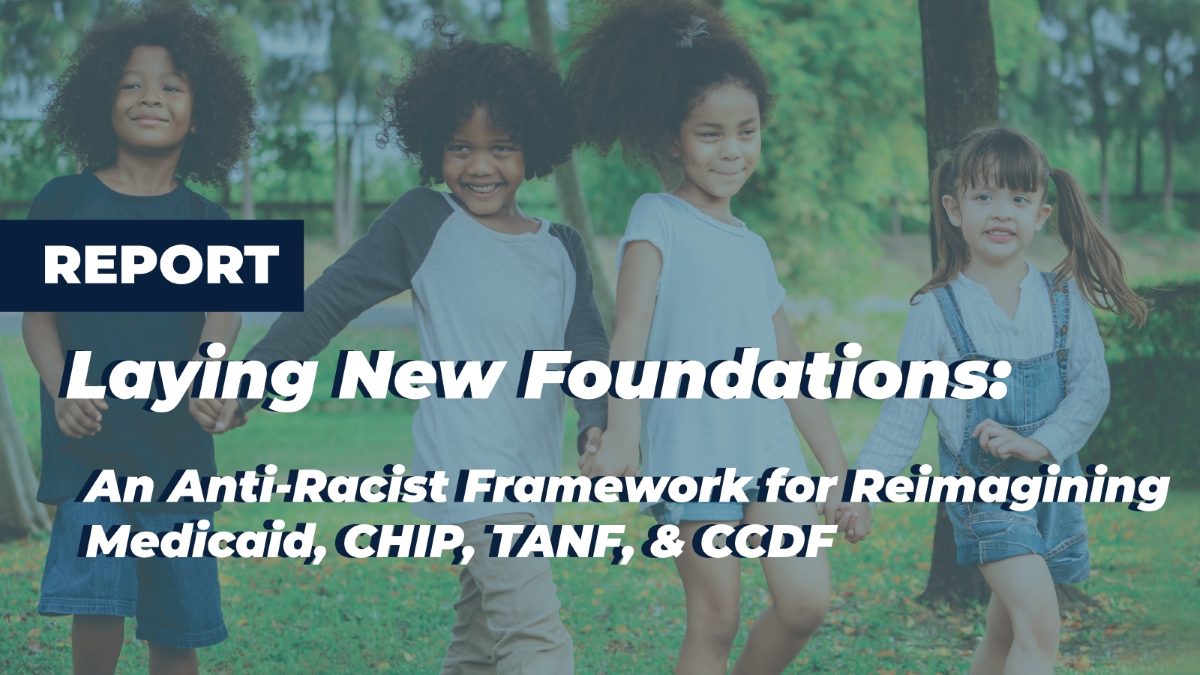
Everyone deserves the opportunity to lead a healthy, stable, and economically secure life. Many government programs aim to provide a stable foundation for all families, but fall short due to legacies of racism. This report puts forth a visionary framework with principles for anti-racist policymaking, focusing on Medicaid, the Children’s Health Insurance Program (CHIP), the Child Care and Development Fund (CCDF), and Temporary Assistance for Needy Families (TANF). It includes three spotlights from leaders in Puerto Rico, Texas, and the District of Columbia applying these principles to advance racial and economic justice in their communities.

Child care is an essential element of our social infrastructure that supports child development, family financial stability, and economic growth. But structural racism and sexism have led to the underinvestment and undervaluation of child care in the United States. This brief, published with the National Women’s Law Center (NWLC) offers a new, anti-racist vision for transforming the Child Care and Development Fund (CCDF) into a program that actively pushes back against structural racism and advances racial equity and economic prosperity for all families. It proposes recommendations for advancing a more equitable child care system.
All children deserve safety, protection, and the opportunity to thrive. And all families deserve support in their efforts to provide a safe and stable environment for their children. The child welfare system is vital to protecting children—but it has disproportionately failed American Indian and Alaska Native, Black, and Latinx children and families. By prioritizing preventative services, programs, and kinship care funded by the Family First Prevention Services Act, child welfare programs can increase the safety and well-being of children and families and reduce unnecessary family separation and foster care placement. This brief highlights progress made by federal child welfare administrators and outlines additional steps they can take to reduce foster care placement through equity-focused implementation of Family First in 2024 and beyond.
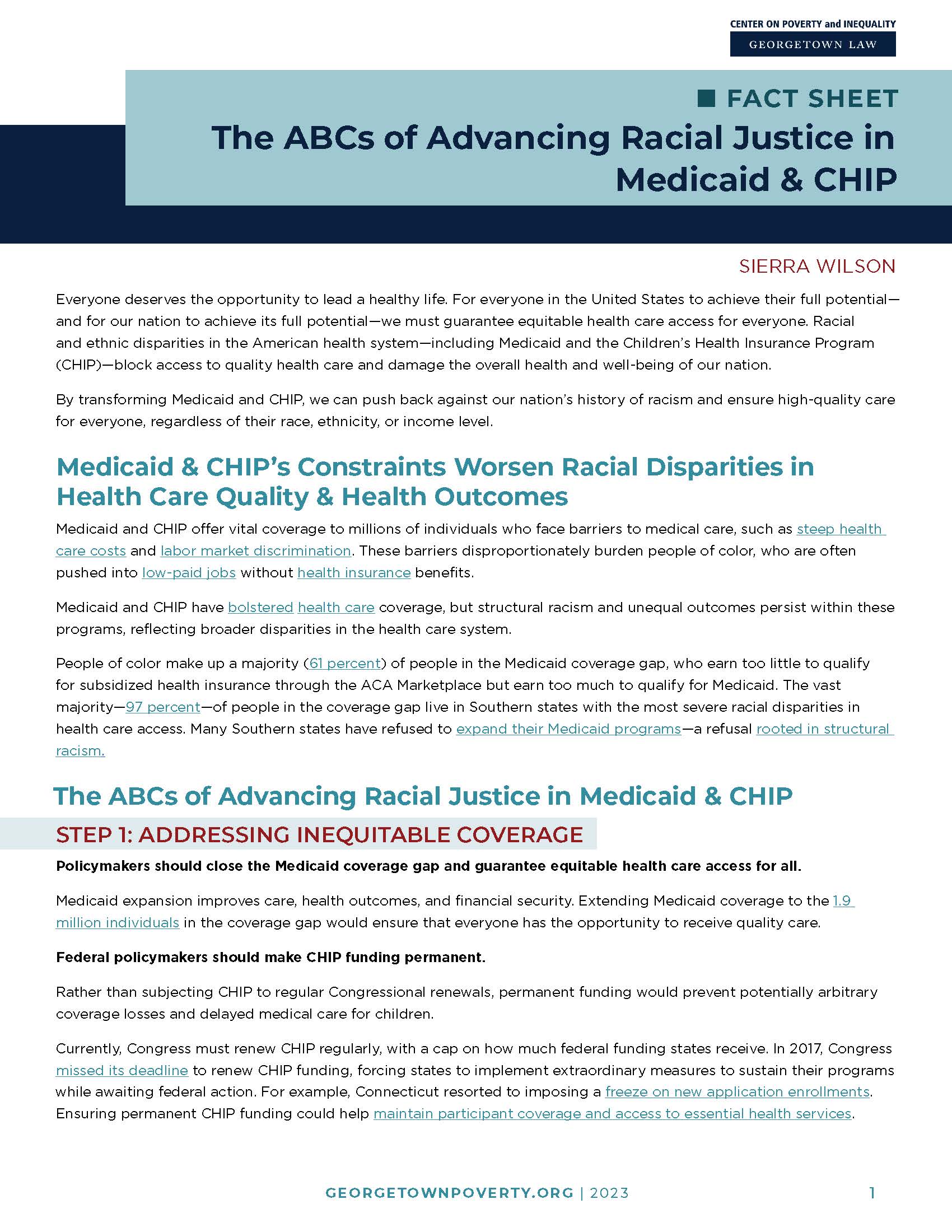
Everyone deserves the opportunity to lead a healthy life. But racial and ethnic disparities in the American health system—including Medicaid and the Children’s Health Insurance Program (CHIP)—block access to quality health care and damage the overall health and well-being of our nation. This fact sheet offers three recommendations to transform Medicaid and CHIP into anti-racist programs.
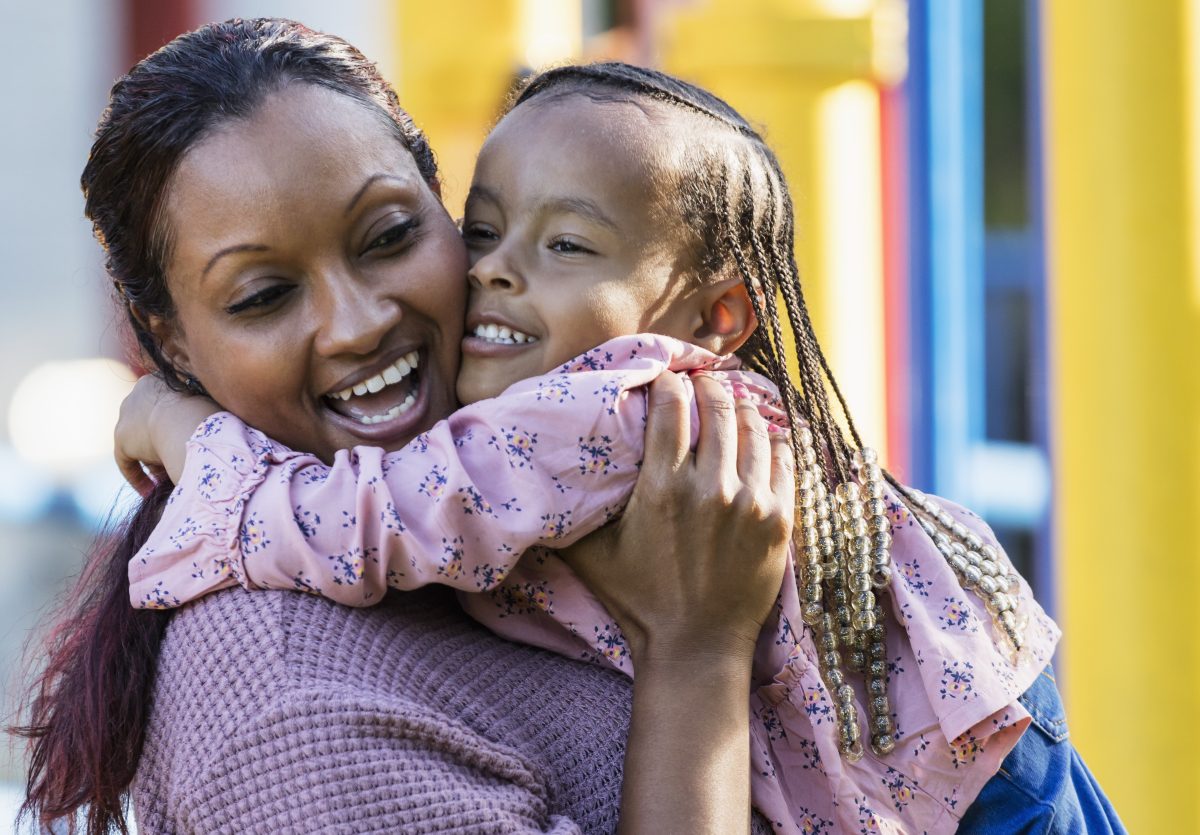
All children and their families deserve resources to take care of their needs, regardless of their family structure. The child support program—which obtains and disburses financial support for millions of children and their custodial parents—should improve family economic security. Ensuring regular child support payments are directed to families and eliminating harmful enforcement measures against parents who are unable to pay would help foster child and family well-being. This brief highlights progress made by federal child support administrators and outlines additional steps they can take to build a more equitable child support program in 2024 and beyond.
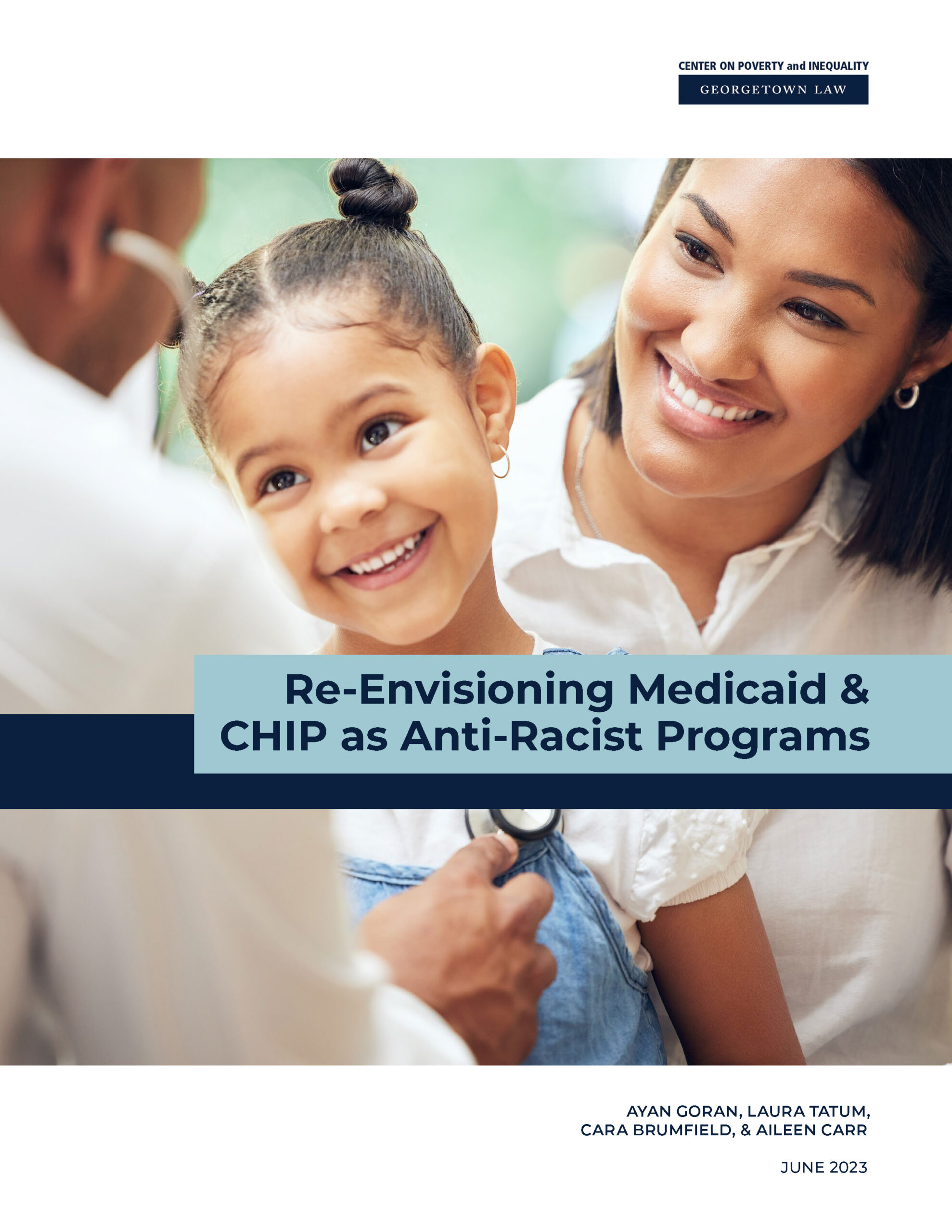
Racial and ethnic disparities in the health care system have long impeded our nation’s health and well-being. For everyone in the U.S. to achieve their full potential—and for our nation to achieve its full potential—we must ensure equitable access to high-quality health care. This report presents an anti-racist re-imagining of the Medicaid and CHIP programs that actively reckons with the racist history of health care coverage. The report offers recommendations to advance racial equity in Medicaid and CHIP. It also provides principles to guide anti-racist policy transformations that center program participants and their communities.

The latest debt ceiling agreement threatens to take away food and cash assistance from people with low incomes—especially older women—if they cannot meet harsh work reporting requirements. The latest bill would add another hurdle to accessing the Supplemental Nutrition Assistance Program (SNAP) for older Americans ages 50-54 and doubles down on existing SNAP time limits for childless adults under 50 and existing work requirements in the Temporary Assistance for Needy Families (TANF) program.

Medicaid is a core pillar of the U.S. healthcare infrastructure that helps ensure that everyone — regardless of income — can have access to quality care. But for decades, the federal government has treated Puerto Rico unequally, covering only half the share of the cost (in comparison to a maximum of 83 percent for states). And the amount of federal funding is subject to an extremely low, arbitrary and unstable cap set by Congress. The perverse result is that one of the poorest jurisdictions in the United States is treated as one of the wealthiest states for Medicaid funding — a program specifically designed to help people and families with low incomes access quality medical care.
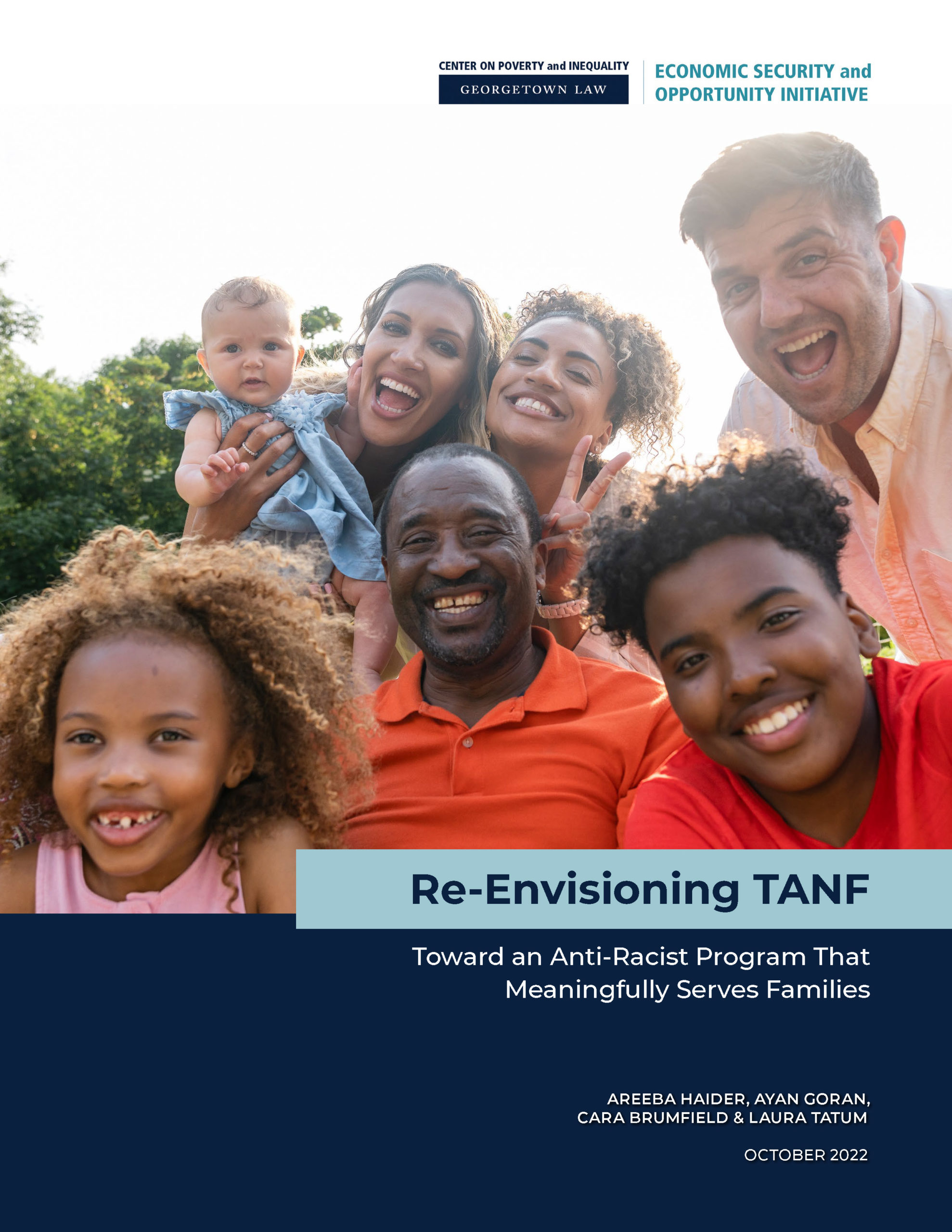
An America where no one experiences poverty is possible. Already, the U.S. has programs with the potential to make this vision a reality, including programs that provide cash assistance, like Temporary Assistance for Needy Families (TANF). The current TANF program provides very little cash assistance and is marked by stark racial disparities, but it has the potential to reduce child poverty, increase economic security, and advance racial equity. This report offers a vision for an anti-racist approach to the TANF program, with new statutory goals and policy recommendations to advance racial justice.

Price increases for basic necessities like tampons have a real cost. Period poverty—the lack of access to sanitary products due to financial constraints—is a public health crisis deserving of a coordinated response that profit-driven private corporations are neither motivated nor prepared to provide. We need resilient supply chains that can be relied on to get basic necessities into the hands of the people who need them—and that will surely require public investment and accountability for powerful corporations.
